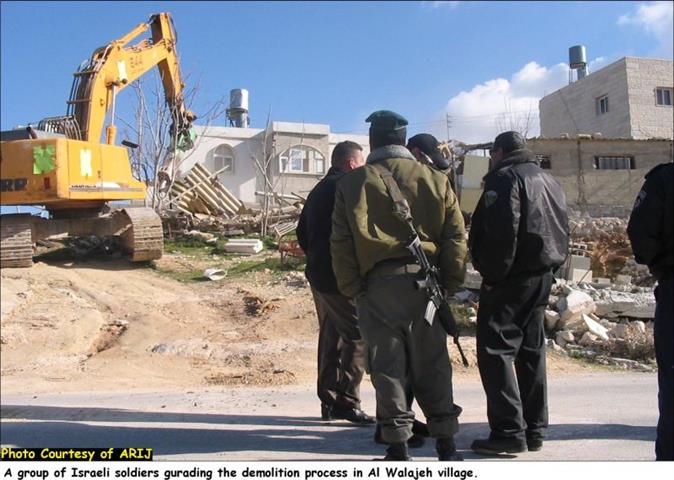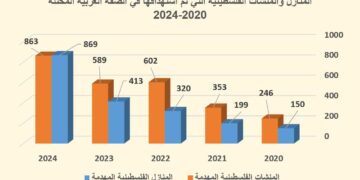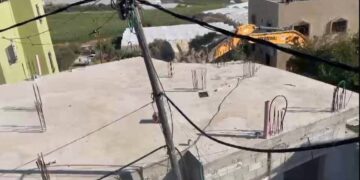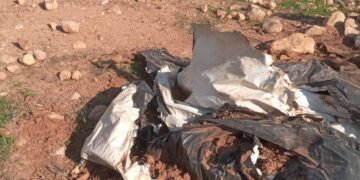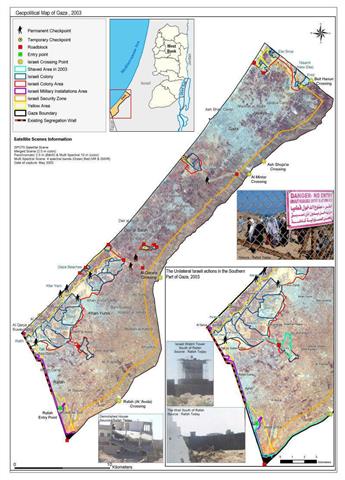At 5:30 am on Tuesday January 17, 2005, and without prior notice, approximately 250 Israeli soldiers, 20 Israeli police officers and several officials from the Israeli Municipality of Jerusalem stormed Al Walajeh village west of Bethlehem. Israeli occupying force came into the village with more than 40 military vehicles, 10 civilian vans and 2 bulldozers and 2 pneumatic drills. Israeli occupying forces were active in the village from 5:30 am until approximately 12:30 pm (7 hours) during which time the village perimeter was declared to be a 'closed military area.' The Israeli forces demolished 6 houses and/or residential spaces and 5 animal sheds and/or workshops located in the village.
Chart One: Victims of Israel's Demolitions in Al Walajeh (January 17, 2005)
|
Name |
Demolished |
|
Mousa Abed Al-Shikh |
Shed |
|
Jamal Bargout |
Residential |
|
Saleem Abu Rizik |
Residential |
|
Nader Abu Khiyarah |
Shed |
|
Waleed Ata |
Shed |
|
Fakhrey Abu Sadoud |
Residential |
|
Samier Jubran |
Residential |
|
Hasan Shehadeh |
Residential |
|
Sa'ed Al-Skikh |
Shed |
|
Ahmad Al-Atrash |
Shed |
|
Imad Abu Al-Teen |
Residential |
|
Total |
11 |
The Israeli occupying forces executing the demolitions failed to present the owners of the demolished houses and sheds with court orders to indicate the reason for the demolishing. Israeli occupation authorities from the Israeli Municipality of Jerusalem, however, were on hand to oversee the demolitions.
Jerusalem municipal officials offered some Al Walajeh residents a document stating that the villagers would not build or expand existing structures on their property. The document was presented to Palestinian landowners during the course of the demolition. Israeli occupying forces halted the demolitions only upon the reception of the landowner's signature. If the signature was granted, the demolition was halted, leaving some structures partially destroyed. The landowners were forced to sign the document under extreme pressure and without time to read the document fully or consult with a legal expert. Israeli occupying forces took the document after it was signed and did not leave a copy with the signer.
The executed demolishing process took place in Ein Al Jouiezeh neighborhood, which has been a targeted by the illegal Municipality of Jerusalem for many years. More than 60 Palestinian homes in the area are scheduled for demolition by Israeli occupation authorities. The neighborhood falls within the illegally expanded Jerusalem municipal boundaries but is considered part of the occupied West Bank according to international law.
Recent plans declared by the illegal Israeli Municipality of Jerusalem (June 2004) suggest that the Ein Al Jouiezeh neighborhood is the planned site of a new illegal Israeli settlement. The new settlement's initial plans call for the construction of 13,500 housing units intended to accommodate 55,000 Israeli settlers. See map below
Israel's policy of demolishing homes in the neighborhood, and throughout Al Walajeh is intended to clear the land for this new settlement. Residents of Al Walajeh are being forcefully evacuated by Israeli occupying forces and Ein Al Jouiezeh neighborhood, in particular, is slowly being ethnically cleansed. For more information, click here.
Home Demolitions in International Law:
Israel's actions in East Jerusalem, including Al Walajeh Village, are in direct violation of numerous United Nations Security Council and General Assembly Resolutions. In particular, UN Security Council Resolution 242 (1967) calls for 'the withdrawal of all Israeli armed forces from the territories occupied' in the 1967 war; and UN Security Council Resolution 465 (1980) applies these principles more directly and forcefully to East Jerusalem, stating: 'all measures taken by Israel to change the physical character, demographic composition, institutional structure or status of the Palestinian and other Arab territories occupied since 1967, including Jerusalem, or any part thereof, have no legal validity.'
In addition, as an occupying power, Israel is bound by the application of international humanitarian law. The home demolition policy, however, violates the most basic tenets of the international legal regime.
The demolition of Palestinian homes and seizure of Palestinian lands to build Israeli settlement, by-pass roads and the Segregation Wall is explicitly outlawed by The Hague Conventions of 1907. Convention IV, Article 23 (G) clearly states that the occupying power is forbidden â??to destroy or seize the enemy's property, unless such destruction or seizure be imperatively demanded by the necessities of war.'
The Fourth Geneva Convention of 1949 also clearly prohibits the destruction of Palestinian homes. Article 53 of the Convention states: 'Any destruction by the Occupying power of real or personal property belonging individually or collectively to private persons, or to the State, or other public authorities or social or cooperative organizations is prohibited, except where such destruction is rendered absolutely necessary by military operations.' Such policies target the civilian population of the Occupied Palestinian Territories and thus cannot be excused on the basis of military necessity.
In fact, Israel's home demolition policy is a fundamental violation of the Fourth Geneva Convention, Article 147 of which clearly prohibits, 'extensive destruction and appropriation of property, not justified by military necessity and carried out unlawfully and wantonly.' According to the Convention, violations of Article 147, including the destruction of civilian infrastructure such as homes, constitute a 'grave breach' of the Convention and should be prosecuted as War Crimes.
Prepared by:
The Applied Research Institute – Jerusalem


